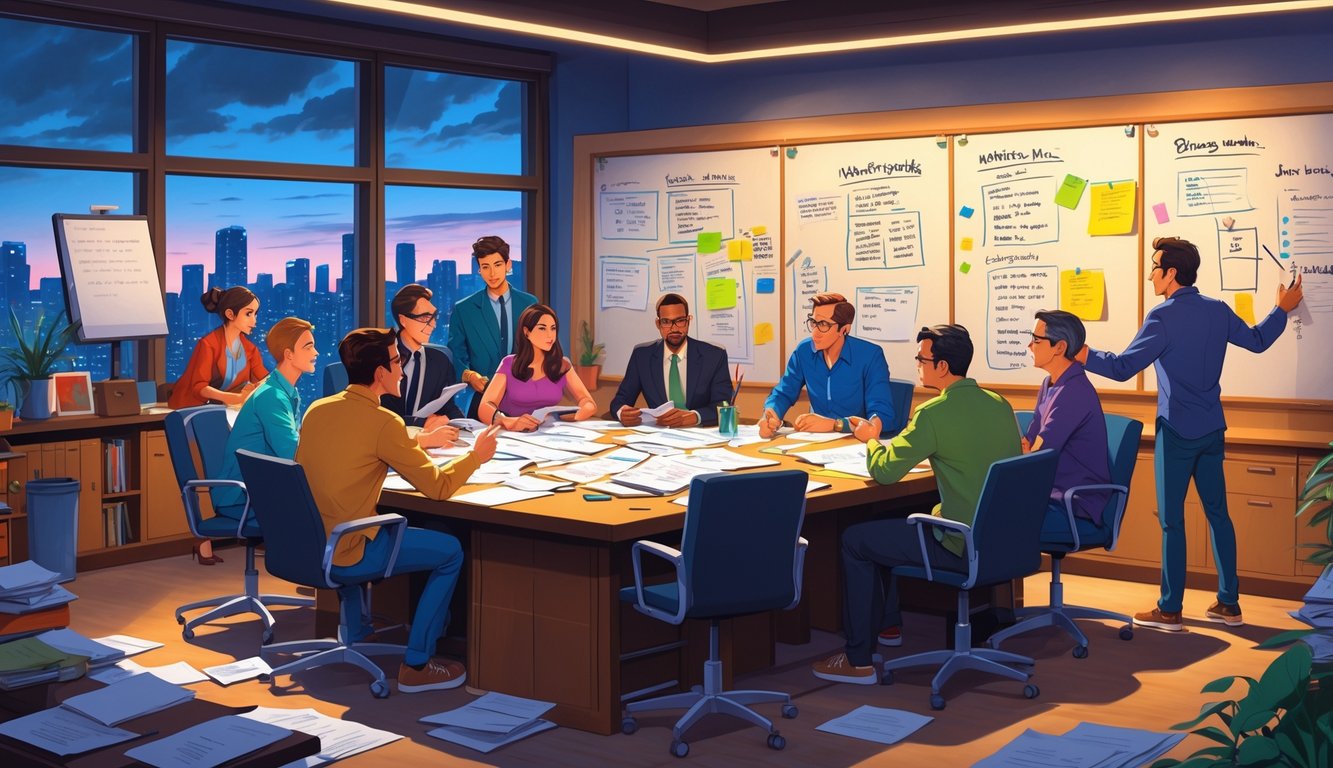
Challenges Facing Writers’ Rooms Today
The coffee machine’s dead, but everyone’s obsessed with budgets and credits and why the Yale MFA staff writer still can’t afford rent. Nothing’s new, but now story editors are juggling three jobs, and showrunners forget your name even when you’re the only one in neon sneakers.
Budget Cuts and Shrinking Staffs
Are writers’ meetings just group therapy now? Because lately, it feels like three people are doing what used to take a dozen. It’s not just “mini-rooms” (who comes up with these names?), it’s the streaming networks with their “prestige” vibes and tiny episode orders. Matthew Belloni (actual journalist, not LinkedIn influencer) said mini-rooms are down to four or five writers, with fewer episodes. That means less pizza, yes, but also rushed storylines, missed jokes, and plot holes you could drive a truck through. And story editors? They’re rewriting scenes all weekend, praying for a renewal, but most of it never even airs.
My dry cleaner swears it’s just a numbers game. Meanwhile, the rooms keep shrinking, and everyone’s texting at midnight: “Did you get that call?”
Job Insecurity and Credit Issues
Here’s what eats at me: someone gets a “co-producer” credit—does that even mean anything? More Zooms, more notes, no real pay bump. I’ve watched junior writers pour months into scripts, only to see their names disappear in rewrites. The WGA said over 33% of TV writers worry about job security, but nobody says it out loud at wrap parties. We’re all supposed to have spec scripts, side hustles, Etsy shops selling plot diagrams, because networks can just pull the plug on a room overnight.
Credits? Don’t get me started. Episodic arbitration is a black hole. You can spend half a year in a “virtual room” (ugh, pandemic), and your IMDB is still a ghost town unless you spot your own dialogue on screen. Staff writers drift, story editors do everything, and nobody ever admits who actually got a show renewed. (Will my therapist take “lost on-screen credit” as a reason for a meltdown? Probably not, but she should.)
Artificial Intelligence and the Future of Writers’ Rooms
Can anyone walk through a set without hearing about AI scripts? Some folks panic about job cuts, some act like chatbots are the second coming. Writers Guild meetings are a mess—contracts get picked apart, everyone’s tense. AI in TV writing is both everywhere and nowhere, and it keeps colliding with stuff that matters—pay, freedom, ownership.
Potential Benefits and Creative Limits
Have I run Sudowrite or Jasper just to see what happens? Yeah, who hasn’t. I’m pretty sure at least one pilot this year got its bones from an AI prompt. But here’s the thing: “creativity” is more than a template. AI spits out structure so clean it’s like flat-pack furniture. Seriously, look at this study. Same sentence length, same beats, everything starts feeling like a Mad Lib.
I know a producer who feeds old fanfic into AI for “dialogue ideas.” Sometimes it works, but the rewrites are a headache. “Efficiency” is a trap. Sure, deadlines are less scary, and you can Slack around AI-generated scenes, but the best bits—the random subplots that come from someone’s weird lunch story—just vanish. AI misses the messy, surprising stuff that makes TV worth watching. Plenty of writers say the same. I’ve tried, and the results are always too neat, too predictable. No spark.
Protecting Creative Jobs
Last summer, I stood on a picket line and just stared at my mentor—actual Emmy winner—and thought, “AI can’t win this.” The WGA keeps fighting for contract language that blocks studios from using AI for anything but maybe spellcheck, because if they don’t, soon it’ll be two writers, then one, then none. That Australian survey where 74% of authors worry about AI stealing jobs? Not even surprising anymore. It’s just exhausting.
Every hiring season, new writers text me about “AI-proof skills.” There aren’t any. Just build relationships, keep pitching, hope someone in charge likes your voice. Google keeps warning about “deskilling”—it already happened to my friend: lost hours, lost insurance. Tech is supposed to “save money,” but then you’re left with scripts that read like IKEA instructions. Is that really cheaper? Or just… worse?
The AI jokes are already stale. Nobody has answers, especially not the people setting budgets or making the call on who gets staffed.
Los Angeles: The Hub of Television Writers’ Rooms
The 101’s a parking lot, group chats never stop, and every coffee line has someone who “knows a showrunner.” LA is just one big, weird office park for TV writers. Shows get brainstormed at diners, rewritten on patios, dissected everywhere. Writers’ rooms aren’t just rooms—they’re living, arguing, eating, and half the time, not even indoors.
How Location Impacts Creativity and Hiring
Is LA air magic for scripts? Doubt it, unless smog counts as inspiration. But writers’ rooms stay here because all the studios and networks are scattered across Burbank, Culver City, the Valley. Commutes become personality traits. If you think geography doesn’t matter, ask the person who landed a Netflix pitch because they were five blocks away and had a laptop. I’ve seen people get jobs just by showing up at lunch.
Hiring? It’s LA or bust. Sure, there are Zooms, but being close means you get the gig—execs want fast rewrites, producers want to pop in, and out-of-towners mostly just stare at the snack table on video. By 2022, about 85% of new scripted series started in greater LA (Writers Guild West says so). Not magic, just proximity and overpriced avocado toast.
The Role of Community in the Writers’ Room Experience
People call writers’ rooms “story factories”—nope. Factories don’t run on memes, gossip, or the feeling your joke bombed but someone else is stealing it. Here, community means arguing about rewrites over tacos at midnight or finding a carpool to Santa Clarita. When one person burns out, someone else’s chaos takes over. It’s rarely about the writing—mostly about who found snacks people don’t hate.
LA writers’ rooms spill out everywhere—picnic tables, BBQs, those “networking” mixers where a sticky note war breaks out over season arcs. Proximity makes it messy, direct, and sometimes unbearably competitive. Everyone’s living in the same handful of zip codes. CBS recently pushed for 40% BIPOC writers’ rooms—I know people who survived LA rent just to get in. No manual explains it, but the back-and-forth in these rooms shapes whole seasons. Sometimes I wish it really was just about what’s on the whiteboard.



